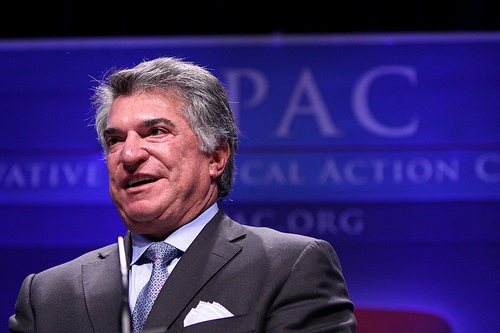Sen. James Inhofe has always said that, although he’s one of the most conservative members of the Senate, he’s a “big spender” on two things: national security and infrastructure. An influential conservative group appears to be humming the same tune.

The American Conservative Union is the 50-year-old organization behind the annual Conservative Political Action Conference (CPAC) and a highly influential rating system for members of Congress. The group’s new effort, the American Strength Program, is dedicated to lobbying Congress to increase spending – words they must have trouble getting their mouths around – on transportation and defense. Their interest in transportation appears to stem from their belief that transportation helps “foster personal freedom” by “facilitating a robust market economy.”
“While it is part of our heritage to question the role and size of government,” reads the group’s proposal, “defense and transportation infrastructure activities are national in scope and require federal leadership and investment.” The proposal was published last week by the New York Times, which broke the story.
The ACU plans to build conservative leadership around the issue to educate Congress and the public, and it plans to start including infrastructure votes in its legislative scorecards. That’s a huge shift – for the “gold standard” of conservative accountability for lawmakers to start rewarding votes for spending and punishing excessive attention to deficits.
This group would have come down harshly on House Republicans in 2011, for example, when they tried to cut transportation spending by a third to keep expenditures in line with revenues. Despite the fact that their actions were motivated by a desire for fiscal conservatism, those lawmakers would have gotten dinged on their conservative ratings for such a move.
If the ACU is successful in reaching out to like-minded groups on this issue, it could change the definition of fiscal conservatism when it comes to transportation. Defense has always been a major exception to conservatives’ desire to cut government spending. As the Times notes, in past years, transportation often got a pass too, with lawmakers of all political stripes lining up to vote for pork-laden infrastructure bills as a way to curry favor. The ACU is trying to make transportation spending something more than a guilty indulgence fueled by parochial (and political) interests. The group wants to reframe robust transportation investment as a true conservative value – even for Tea Partiers, whose style is to take no prisoners when it comes to budget cuts.
The draft proposal for the new effort doesn't specify what kind of transportation infrastructure the group plans to fight for. Sometimes even conservatives with a penchant for funding roads and bridges draw the line at transit and active transportation investment. Inhofe himself is Exhibit A for that approach.
It may come as no surprise that industry is bankrolling the American Strength Program. Noting that they've "often had trouble convincing our conservative friends that transportation infrastructure is a valuable investment," American Road and Transportation Builders Association vice president Richard Juliano is raising money among transportation lobbyists and executives for the new effort. He hopes that a group with the ACU's right-wing street cred will succeed where the trade group has failed.
But the quid-pro-quo nature of the ACU's new zeal for transportation spending may doom their outreach to other conservatives from the start. The Times quotes leaders from the Campaign for Liberty and FreedomWorks, who bash the big-infrastructure concept. They may be right to question the ACU's motives: It's unclear how much industry groups are paying them to launch this effort and whether that's a primary motive behind it, but the Times notes that the ACU has sold policy positions for cash before.





